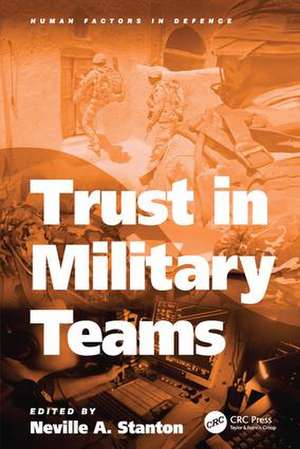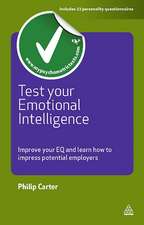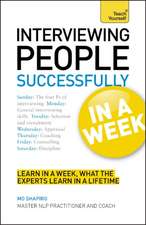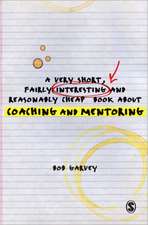Trust in Military Teams: Human Factors in Defence
Editat de Neville a. Stantonen Limba Engleză Hardback – 28 iun 2011
| Toate formatele și edițiile | Preț | Express |
|---|---|---|
| Paperback (1) | 489.00 lei 6-8 săpt. | |
| CRC Press – 31 mar 2017 | 489.00 lei 6-8 săpt. | |
| Hardback (1) | 1061.81 lei 6-8 săpt. | |
| CRC Press – 28 iun 2011 | 1061.81 lei 6-8 săpt. |
Din seria Human Factors in Defence
- 18%
 Preț: 1114.08 lei
Preț: 1114.08 lei - 8%
 Preț: 383.57 lei
Preț: 383.57 lei -
 Preț: 487.75 lei
Preț: 487.75 lei -
 Preț: 487.02 lei
Preț: 487.02 lei - 22%
 Preț: 324.16 lei
Preț: 324.16 lei - 15%
 Preț: 427.16 lei
Preț: 427.16 lei - 22%
 Preț: 340.62 lei
Preț: 340.62 lei - 15%
 Preț: 427.16 lei
Preț: 427.16 lei - 18%
 Preț: 1115.51 lei
Preț: 1115.51 lei -
 Preț: 489.00 lei
Preț: 489.00 lei - 15%
 Preț: 461.03 lei
Preț: 461.03 lei - 15%
 Preț: 568.28 lei
Preț: 568.28 lei - 18%
 Preț: 1108.56 lei
Preț: 1108.56 lei - 15%
 Preț: 422.76 lei
Preț: 422.76 lei - 15%
 Preț: 429.62 lei
Preț: 429.62 lei - 15%
 Preț: 427.16 lei
Preț: 427.16 lei - 26%
 Preț: 456.63 lei
Preț: 456.63 lei
Preț: 1061.81 lei
Preț vechi: 1294.89 lei
-18% Nou
Puncte Express: 1593
Preț estimativ în valută:
203.17€ • 212.13$ • 168.15£
203.17€ • 212.13$ • 168.15£
Carte tipărită la comandă
Livrare economică 04-18 aprilie
Preluare comenzi: 021 569.72.76
Specificații
ISBN-13: 9781409404484
ISBN-10: 140940448X
Pagini: 296
Dimensiuni: 156 x 234 x 18 mm
Greutate: 0.66 kg
Ediția:1
Editura: CRC Press
Colecția CRC Press
Seria Human Factors in Defence
ISBN-10: 140940448X
Pagini: 296
Dimensiuni: 156 x 234 x 18 mm
Greutate: 0.66 kg
Ediția:1
Editura: CRC Press
Colecția CRC Press
Seria Human Factors in Defence
Cuprins
Contents: Preface; An introduction to trust in military teams, Neville A. Stanton; Section 1 Experimental Studies into Mood, Personality and Training: The impact of mood on interpersonal trust: implications for multicultural teams, Charlene K. Stokes, Joseph B. Lyons and Tamera R. Schneider; Predictors and outcomes of trust in teams, Joseph B. Lyons, Charlene K. Stokes and Tamera R. Schneider; Exploring the impact of cross-training on team process, Joseph B. Lyons, Gregory J. Funke, Alex Nelson and Benjamin A. Knott. Section 2 Multinational Challenges for Trust: Trust in swift starting action teams: critical considerations, Jessica L. Wildman, Stephen M. Fiore, C. Shawn Burke, Eduardo Salas and Sena Garven; Trust in distributed operations, Anna T. Cianciolo, Karen M. Evans, Arwen H. DeCostanza and Linda G. Pierce; Trust in international military missions: violations of trust and strategies for repair, Ritu Gill, Megan M. Thompson and Angela R. Febbraro; Cultural influences on trust, Sandra C. Hughes, Cecily E. E. McCoy, Gabriella Severe and Joan H. Johnston. Section 3 Trust in Technology: A reliance model for automated combat identification systems: implications for trust in automation, Justin G. Hollands and Heather Neyedli; User trust in new battle management technology: the effect of mistrust on situation awareness, Paul M. Salmon, Neville A. Stanton, Guy Walker, Daniel Jenkins, Laura Rafferty and Kirsten Revell; Active trust management, Elisabeth W. Fitzhugh, Robert R. Hoffman and Janet E. Miller; Teamwork and trust: a socio-technical perspective, A. J. Masys; Indexes.
Notă biografică
Professor Neville A. Stanton holds a Chair in Human Factors and has published more than 150 international peer-reviewed journal papers and 20 books on Human Factors and Ergonomics. In 1998 he was awarded the Institution of Electrical Engineers Divisional Premium Award for a co-authored paper on Engineering Psychology and System Safety. The Ergonomics Society awarded him the President's medal in 2008 and the Otto Edholm medal in 2001 for his contribution to basic and applied ergonomics research. The Royal Aeronautical Society awarded him the Hodgson Medal and Bronze Award with colleagues for their work on flight deck safety. Professor Stanton an editor of Ergonomics and on the editorial board of Theoretical Issues in Ergonomics Science and the International Journal of Human Computer Interaction. Professor Stanton is a Fellow and Chartered Occupational Psychologist registered with The British Psychological Society, and a Fellow of The Ergonomics Society. He has a BSc in Occupational Psychology from Hull University, an MPhil in Applied Psychology from Aston University, and a PhD in Human Factors, also from Aston.
Recenzii
'More than any other occupation or organization, military endeavours are completely dependent upon trust. However, trust has many dimensions to it: trust in your comrades; trust in your allies and trust in your equipment. This book with contributions from experts from both sides of the Atlantic examines all these aspects of trust. This volume is set to become the definitive reference source for all researchers and practitioners working in this area.' Don Harris, HFI Solutions Ltd. 'Trust has emerged as a critical contributor to success in our increasingly complex and uncertain world. The role of trust is perhaps most powerful in military teams, where complex technology and diverse, distributed multinational teams confront life-and-death challenges. Unraveling the complex and multi-faceted role of trust in these situations is a daunting challenge. Stanton and his colleagues have risen to this challenge -Trust in Military Teams brings together fresh perspectives and methods to understand trust. Trust in Military Teams provides an excellent resource for anyone grappling with trust in complex sociotechnical systems.' John D. Lee, University of Wisconsin-Madison, USA 'If you need a reason to read this book ... I suggest you read the last chapter. It is a compelling description of the importance of teamwork and trust in military operations complete with case studies from current military systems. The editor of this book, Neville A. Stanton has compiled both a reference source for those involved in research and for those involved in system development. I finished Trust in Military Teams with a new knowledge of the influence of team trust on human performance and a conviction that system development can influence this trust.' HFES European Chapter Newsletter, No2, 2011 ’Especially useful for the researcher picking up this book is the indication in each chapter on how research can be progressed in that particular area. The contributors are very aware that much sti
Descriere
Written under the auspices of the The Transfer Cooperation Programme, this book reports on contemporary trends in the defence research community on trust in teams, including inter- and intra-team trust, multiagency trust and coalition trust. It also considers trust in information and automation, taking a systems view of humans as agents in a multi-agent, socio-technical, community. The different types of trust are usually found to share many of the same emotive, behavioural, cognitive and social constructs, but differ in the degree of importance associated with each of them.








